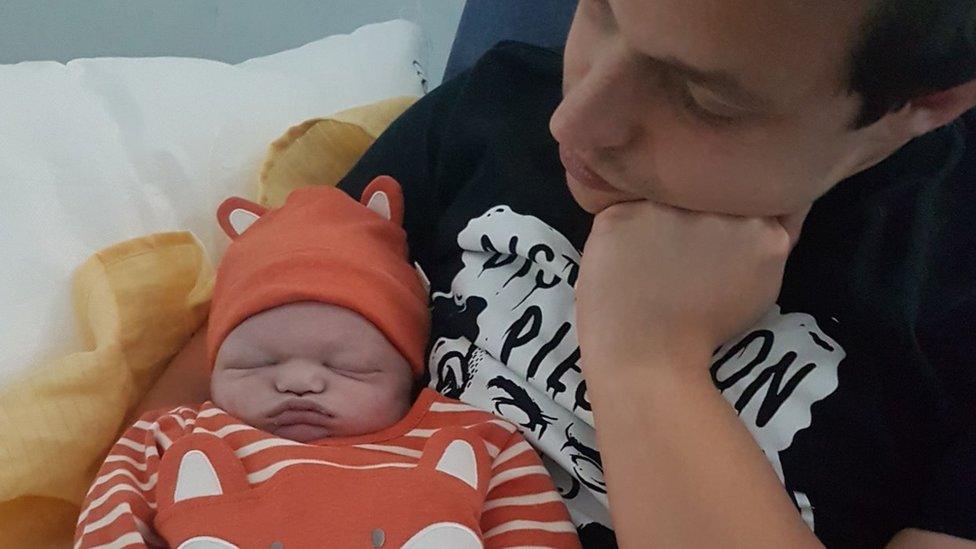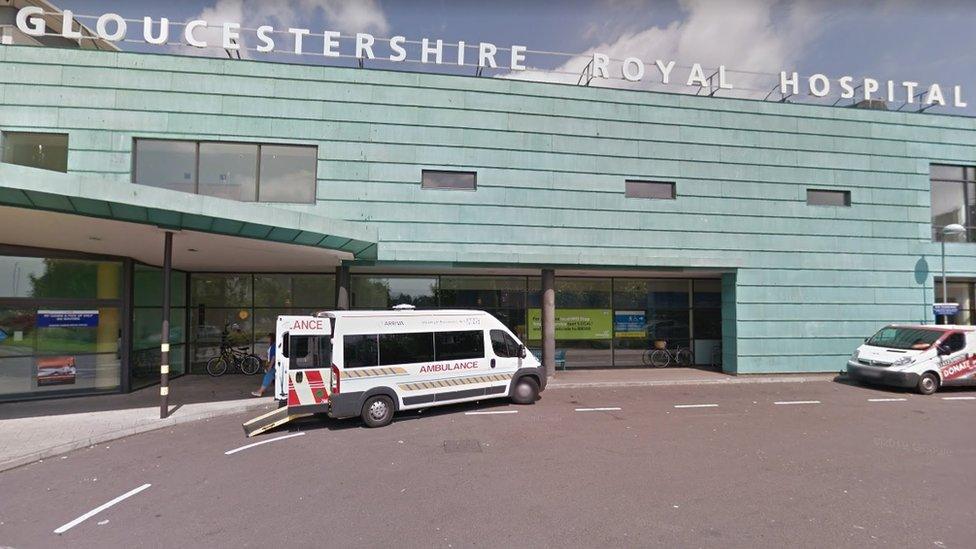Baby Freddie died due to 'competing' hospital priorities - inquest
- Published

Freddie "would have likely responded to resuscitation sooner if blood had been given earlier," a safety board finds
A baby died due to "competing clinical priorities" in a maternity unit where three women needed emergency Caesareans but only one theatre was available.
Jay Whewell's son Freddie died five days after he was delivered on 24 May 2020 at Gloucestershire Royal Hospital.
His skull was fractured during delivery and his brain was starved of oxygen.
A coroner heard delays in diagnosing an obstructed labour and in delivering bloods, plus a delay in operating possibly contributed to the death.
The maternity unit in Gloucester had just one theatre available at the time, and it was very difficult for a second to be opened at weekends, Gloucestershire Coroner's Court heard.
Freddie was transferred to Bristol's Neonatal Intensive Care Unit but later died.
Assistant Gloucestershire Coroner Roland Wooderson recorded a narrative conclusion.
He said an independent inquiry by the Healthcare Safety Inspection Board "concluded that obstructed labour should have been suspected at 9.17am".
'Team not available'
"There is no evidence that it was so suspected by clinicians," his verdict stated.
Another obstetrician diagnosed obstructed labour at 13:25 BST.
The inquest heard that prior to entering theatre, Mrs Whewell was given a small dose of oxytocin which can increase the strength of contractions.
"The clinical plan was to stop the administration of oxytocin, and to stop pushing, and to take Mrs Whewell to theatre for a trial instrumental delivery by caesarean section," Mr Wooderson said.
"Due to competing clinical priorities the obstetric theatre team was not available until 3.15pm.
"The attending clinicians did not believe that it was possible to open a second operating theatre to deliver Freddie.
"The Healthcare Safety Inspection Board found that the delay in going to theatre may have contributed to Freddie's head becoming deeply impacted."

Baby Freddie died after his mother was forced to wait for an emergency caesarean
The verdict said it was deemed "unsafe to proceed with instrumental delivery" and that the Caesarean section birth was complicated by "an impacted foetal head", needing "additional manoeuvres to dis-impact Freddie's head".
"HSIB also found that there was delay in retrieving emergency neo-natal blood as theatre staff were uncertain about where this was kept and that Freddie would have likely responded to resuscitation sooner if blood had been given earlier."
Freddie was moved to St Michael's Hospital in Bristol and died on 29 May, 2020.
The post-mortem showed the cause of his death was "traumatic and hypoxic injury to the brain consistent with the history of a difficult birth delivery with impaction of the skull in the pelvis requiring manual manipulation of the head".
The safety board has recommended a number of changes since, including formalising the use of the second operating theatre by the use of the Trust's at risk register, should there be limited availability.
It also recommended further training and stated neo-natal blood should be readily available.
Professor Mark Pietroni, from Gloucestershire Hospitals NHS Trust, said the circumstances of Freddie's death were "tragic" and "we would like to extend our heartfelt sympathies to the family".
"We are committed to learning all we can from this.
"The coroner was satisfied with the progress that the Trust has made in implementing the recommendations of the Healthcare Safety inspection Board, including the provision of a second emergency theatre team.
"We will ensure that they are embedded in our practice for the future."

Follow BBC West on Facebook, external, Twitter, external and Instagram, external. Send your story ideas to: bristol@bbc.co.uk
Related topics
- Published13 October 2022
